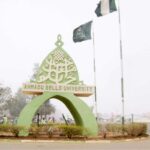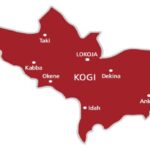Spending one’s annual leave in a sister African country full of historical antecedents like Ghana was a great opportunity for me after working for a whole year in Nigeria’s most dangerous city, Maiduguri.
So when the Development Research and Projects Centre (DRPC), in collaboration with USAID, invited me as a fellow of the international institute of education’s LDM program on reproductive health, to spend 10 days understudying the health systems in Ghana along with 30 other senior government officials working in the health sector from the North West part of Nigeria, the invitation was excitedly grabbed.
Working in Maiduguri even for a week is hectic, dangerous, and exhaustive. Any opportunity to leave it, therefore, is always a welcome invitation. It is an assurance that you will at least, be alive for the period you will be away.
We left Nigeria on the September 22, and spent the rest of the month studying the Ghanaian health system, attending lectures and visiting their health facilities and universities. After an exhaustive four days, we were given a day off to visit tourism centres that abound across Accra. I chose, first, to visit one of my African revered icons, Kwameh Nkrumah.
Kwame Nkrumah was a philosopher, teacher, politician, elder statesman and one of Africa’s greatest minds and leaders.
Paying homage at his mausoleum was a great experience any student of African history and politics will love to have. And so it was when, along with a friend from Zamfara state, and guided by a local, we spent three hours appreciating the life and time of a man who is still being remembered as the father of anti-colonialism in Africa.
His revered contributions to the emancipation of Africans may be controversial in some ways, but his dogged, consistent and intellectual perspective to the struggle against colonialism is universally acknowledged as unmatched by any other African nationalist.
Dr Nkrumah came to the fore of the struggle against colonialism when his contemporaries had almost given up on the possibility of chasing out the colonialists from the then Gold Coast. His radical views, intellectual approach, massive and consistent opposition rattled the British colonialists and his contemporary Ghanaian co-strugglers.
Despite internal opposition against his style and approach, he broke away from the conservative Ghanaian elites to form his political movement, a platform he used to not only chase the colonialists out of Ghana, but rallied the emerging intellectual young nationalists into a formidable force that would later lead Ghana to independence and prosperity.
His emergence as the president was one of the greatest political emancipation events that would come to shape the socio-political and economic history of one of the greatest nations in sub-Saharan Africa.
His views on international politics, his love for Africa and the defence of its people through his numerous intellectually well written books rattled the western powers and uprooted their local allies.
He would later be overthrown and forced into exile in Guinea-Conakry until he was pardoned and returned to his country where he died and was buried a hero, nationalist, and Ghana’s most respected leader.
A visit to his mausoleum in the heart of Accra reminded none of his revered status in the history of modern Ghana. Within the mausoleum lies the collection of his books in big signboards.
Tourists could not but marvel at the intellectual contributions of this great African nationalist. His book, “Neo-colonialism, the Last Stage of Imperialism,” welcomes visitors and opens a perspective into the man the mausoleum was opened to honour.
Several of his other books are erected around and labelled for visitors to see and appreciate his contributions, not only to politics and the economy, but to knowledge and the development of education in Africa.
The mausoleum contains resources on all the history of the people of Ghana, his life and his struggles in Ghana and around Africa. The mausoleum comprises five major components dissecting the life of this great African.
Apart from the tomb, where he, along with his beautiful Egyptian wife, Fathia lay, his statue is another attraction, dressed in the Ashante wrapper. Many tourists surrounded the sculpture admiring a hero many of them had only heard of.
A mini museum chronicling his life and work stands at the far end of the mausoleum. In this room lies a complete history, his belongings, his beddings, from university days, and almost all of the property he used during his life time.
Outside, near the tomb, stands the only vehicle he used while he lived in Accra. And around the beautifully adorned mausoleum, are sculptures of the many ethnic groups that form the present-day Ghana.
Visiting this significant historical mausoleum will not be complete without seeing the damaged statue of the great African, a result of the first coup alledgedly instigated by the West. This damaged statue stands next to his museum and library.
After relishing the memories of the great African leader, myself, along with my friend who is also the sole administrator of Tsafe Local Government Area in Zamfara state, Alhaji Saminu Tsafe, and our guide, Yusuf, a Hausa Ghanaian, moved to the Presidential Villa Beach.
The beach is sandwiched between the Independence Square and the Presidential Villa, where the president and his family reside. Although it is a stone’s throw from the president’s residence, it is still open to the public as families and friends could be seen enjoying the cool breeze.
Many women could also be seen bathing in the sea sand and I was later told it is believed that any skin ailment will be cured by the application of the beach’s sand. And many believe in the superstition.
I made many friends there, including a young and beautiful Ghanaian lady who appreciates that we are Nigerians, and of course, her boyfriend who invited us for a group picture to welcome us to what they call ‘the greatest land on African soil’.
Moving across the length and breadth of Accra is a mighty work of decision that requires sacrificing a deal of time, but as tourists, we were determined to do it. So, up we left to the beautiful, busy and blue beach of Bojo Island.
Bojo Island is located at the Bortianor, along Kokrobite road in the suburb of Accra. It could be described as nature’s best secret in Ghana. It is a beach with white sand, blue sea and a clean environment.
The Bojo Beach is located near a fishing village along the delta of the Desu River and it is linked with the Atlantic Ocean. It is said that its origin came from the Atewa range and it is an island that visitors have to cross the Densu River before they can reach.
Cool and magnificent, Bojo island provides tourists with an opportunity to see nature’s wonder as massive waves hit the banks; a combination of breeze and sounds rattle the island, making an interesting ocean rhythm in the area.
Riding the water cruiser was one of the attractions at Bojo island, and although neither myself nor my friend had ever done that, all we required was a five-minute mentoring before we spent the next 15 minutes riding at high speed deep inside the Densu River on the motorbike.
The island also has lots of entertainment; including golf, music and several water sports that many families could be seen enjoying.
Spending the remaining day at Bojo island was a fantastic and memorable experience I will always willingly repeat, especially as an inhabitant of the Sahelian region of Nigeria where beaches are not found, such experience is rare.
Ghana is a country of many beaches, many castles, many falls and historical monuments and one of such is the presidential office complex; a big architectural master piece; an aesthetically appealing structure. The Flagship House, as it is officially known, is a pride to behold, a sign of the emergence of Ghana as an economic giant in the West African region.
Although entrance into the premises is strictly by invitation, watching the structural masterpiece from outside is a delight to tourists and we enjoyed it. The Flagship House is separate and distinctive from the presidential residence at the river bank earlier discussed. Both are however a tourist haven and having the opportunity to visit and see them is another wonderful experience.
Ghana is an antique collection destination for lovers of the ancient terra cotta and traditional artisanship. It is home to the Krobo beads, the northern leather industries and the famous straw products. The wood carvings of the great Ahwaai-Ashanti and the Aburis in the eastern part of the country are equally a delight to see.
Accra, the country’s capital is littered with monumental edifices such as the World Trade Centre, the National Theatre and the National Museum, the magnificent Catholic Statue, and several other emerging skyscrapers, a sign of Ghana’s up-and-coming new economic status; thanks largely to the discovery of oil which has already shot the country’s gross domestic product GDP to over 30% in 2011 alone.
We also visited Winneba, an old ancient coastal city on the gulf of Guinea. This historical city served as the port centre of the colonialists. The famous warehouses of the Dempsters are still standing in the middle of this historical city.
The city is also famous for its annual Deer hunting festival which we missed because it is usually held in May every year, and we visited by September. Winneba is also home to the unique fancy dress contest by the brass band and generally, I was told, music is the pass time of the Etulu people of Winneba city.
There are also the famous practices of the traditional ancient herbalists who could be seen on sale across the length and breadth of the greater Accra city.
The country is full of traditional ancient festivals that enable visitors to witness one of Africa’s heritages of pomp and pageantry symbolized by the traditional Kings and Queen mothers riding on their lushly glided palanquins.
For a Muslim visitor to this land of ancient histories, enjoying the pleasure of tourism will not be complete without visiting the great and mysterious Mosque of Larabanga. It is a great ancient Mosque which legends say was built by the Angels. Really, no one could tell who built this magnificent ancient architectural edifice.
It is unarguably the oldest Mosque in Ghana and praying inside it, they say, is a sure way to salvation and fulfilment of desires.
One, especially a Nigerian, will never complete any story on this land without acknowledging that electricity is a 24-hour all-year experience. Water too is readily available.



